#ETTD -USMCA turns out AFL-CIO files 1st complaint of its kind - watch this space
The Trump Admin singled over and over that his administration was less than fond of Unions and often spoke about collective bargaining in the worst light possible
The full text of the agreement between the United States, Mexico and Canada (USMCA), click here.
Congressional Democrats:
For context back in December 2019, after impeaching Trump, Congressional Democrats effectively green lit NAFTA 2.0 aka USMCA - but with a few major caveat. Say what you want about House Democrats but consistently they fight for better worker’s rights, fairer worker’s wages, a more equitable solution for all stakeholders All while striving to protect the environment, strength our economy and improve access to more affordable prescription drugs. See CRS Report with a side by side comparison - IF10997|U.S.-Mexico-Canada (USMCA) Trade Agreement
USMCA Demands by Democrats:
A brief summary of what the House Democrats successfully negotiated, that was included in USMAC:
Stronger Labor Rules - these key changes actually strengthen the rules in favor of the worker versus the corporation;
Removed language making it difficult to prove that our trading partners are failing to live up to commitments to protect workers from violence.
Created a presumption that a labor violation affects trade and investment and will require the other government to prove otherwise.
Removed language in the Forced Labor provision that had made it effectively unenforceable.
Robust and proactive Monitoring of the terms and conditions of USMCA. To ensure all parties are in “compliance” with the labor-specific requirements
Created an interagency committee that will monitor Mexico’s labor reform implementation and compliance with labor obligations.
Ongoing reporting requirements to Congress.1
Established key benchmarks for Mexico’s labor reform implementation process. Failure to comply with these benchmarks will lead to enforcement action under the agreement.
Established Labor Attachés that will be based in Mexico and will provide on-the-ground information about Mexico’s labor practices.
The Creation of a NEW interagency committee, which “shall he” chartered following
Conduct an assessment of the current environment landscape of Canada and Mexico;
Monitor implementation of the environment obligations and recommend enforcement actions in connection to the new NAFTA; and
Provide a platform for better coordination, utilization, and funding of U.S. Government efforts to strengthen environment practices amongst NAFTA Parties.
Rapid-Response Enhanced Labor Enforcement (RRELE);
if past is prologue the lessons learned by past Trade Agreements, that State-to-State (USA Mexico, USA Canada and vice versa) dispute resolutions and “settlement agreements” and mandatory arbitration ended up with each party loosing and a ton of lawyers getting rich. With this tough life-lesson learned, the House Democrats were unwavering and didn’t flinch when the Trumpian-White House, Trump, Trade Advisors and/or Trump’s economic counsel made a lot of threats. Instead the House Democrats stood their ground and unflinching to ensure the USMCA also included the following provisions - time being of the essence and strengthen Unions
The RRELE immediately went into effect upon entry into force of the agreement;
Provides for facility-based enforcement of labor obligations in the agreement within a rapid timeframe;
Covers all manufactured goods and all services traded between the United States and Mexico;
Requires verification of compliance by independent labor experts; and
Leads to penalties on goods and services that are not produced in compliance with the freedom of association and2 collective bargaining obligations.
Additional Accountability measures added to the USMCA;
A new customs verification mechanism to ensure that only legally harvested and taken flora and fauna are traded through Mexico;
A new authorization of the North American Development Bank and funding for EPA grants under the Border Water Infrastructure Program to address pollution on the U.S.- Mexico border; and
Additional funds to the Trade Enforcement Trust Fund to be used for environment- focused enforcement efforts.
USMCA November 2020 Report Card
And yes I’ll readily admit that most don’t dive this deep into various public policies. But it’s important to have a broader context and more content to fully understand the Federal Lawsuit that AFL-CIO et al filed on May 10, 2021. As previously elucidated the House Democrats fought hard for the workers and Unions that protect the same workers. If you read the USMCA November 2020 Report Card, which reads in part:
GRAVE CONCERNS – labor implementation on the wrong track
CONCERNS – enforcement tools not being used
USTR and DOL have slowly added staff, it appears that the agencies are still in reactive posture, waiting for someone to bring them cases. The USMCA was supposed to shift the burden onto the government.
We’re still waiting on the first enforcement action of any kind, and the preparation of a complaint has largely been left to organized labor and the private sector, even though we know that workers in Mexico are being denied their basic rights on a daily basis.
🔻IMPORTANT DISCLOSURE MADE🔻Meanwhile, union leaders and labor lawyers who try to exercise those basic rights face violence, arrest and detention as a result. This must change, and we’ve given USTR and DOL the resources to do it.
FIRST LABOR COMPLAINT FILING UNDER USMCA RAPID RESPONSE MECHANISM
Plaintiffs:
AFL-CIO, the Service Employees International Union (SEIU), the Sindicato Nacional Independiente de Trabajadores de Industrias y de Servicios Movimiento 20/32 (SNITIS) and Public Citizen
Cause of Action/Complaint
Per the AFL-CIO et al May 10, 2021 Press Release - in Mexico some labor unions are not the traditional labor unions most Americans think of.
For two years, workers at Tridonex have been harassed and fired for trying to organize with SNITIS, an independent Mexican union of their choice, to replace a corrupt “protection” union.
Workers at Tridonex, a subsidiary of Philadelphia-based Cardone Industries Inc., make auto parts, a substantial portion of which are for the U.S. market. Tridonex has refused workers’ legal demand to stop withholding their dues and transferring them to the protection union. The company has fired more than 600 supporters of the independent union, SNITIS, which formed after worker protests in 2019 forced the maquiladoras in Matamoros to raise wages.
The Tamaulipas state government has acted on the company’s behalf, blocking the workers’ demand for an election and arresting Prieto, who has led worker protest movements in both Tamaulipas and the border state of Chihuahua. Shortly after Prieto was released from jail in Tamaulipas and exiled to Chihuahua, the government there also brought bogus criminal charges against her and, even with the repeated COVID-19-related delays, seem intent on imprisoning her again.
In order to help you understand the process, below is a brief step by step of what happens and what’s triggered —obviously predicated on the context of the Complainant’s complaint. USMCA Document Website via US Trade Representative - below are the main chapters relevant to the USMCA Complaint.
Chapter 23 - Labor
Chapter 31 - Dispute Settlement
Chapter 32 - Exceptions and General Provisions
USMCA Rapid Response Process:
…the Rapid Response mechanism, requires United States or Mexico in good faith believes that a “Covered Facility” is denying its workers their rights of free association and/or collective bargaining.
Under the Terms and Conditions of the USMCA a “Covered Facility” is defined as a facility that;
…produces a good or supplies a service traded between the United States and Mexico or
…produces a good or supplies a service in the United States or Mexico that competes in that country with the other Party’s good or service in the other Party’s domestic market.
Now some will disagree —I’d argue “read the goshdarn trade agreement -all of it -including the forking footnotes” because there’s a catch, provided you’ve read the entire USMCA and have the ability to recall relevant sections of the voluminous agreement. Unquestionably the USMCA stipulates that a Denial of Rights claim can only be brought with respect to the United States “if the facility is covered by a National Labor Relations Board (NLRB) enforced order”
This stipulation could significantly limit the availability of the Rapid Response Mechanism in labor disputes and workers rights. Gosh it’s almost like I actually do this for a living, almost <snort>
Conversely and yes, this is equally important —The aforementioned NLBR limitation does not apply to claims brought against Mexican facilities. Meaning a claim can be brought for a Denial of Rights under legislation “necessary” to comply with Mexico’s obligations under USMCA Article 23. 3
…based on the Committee’s review and if they conclude, the petitioning party has a good faith basis to believe that a Denial of Rights has occurred, the USMCA stipulates that the respondent(s) can choose to conduct a review, it is then requested to report within 45 days of the review request whether it has found a Denial of Rights.
If the responding party concludes there was no “denial of rights” the petitioning party (at any time) can then request via the secretariat the creation of a Rapid Response Labor Panel to independently review the claim. See Article 31-A.5: Requests for Establishment of Rapid Response Labor Panel - which the USMCA Secretariat is vested with the power to establish a three person Panel;
… by selecting a qualified individual from each of the following: (a) a list jointly created by the United States and Mexico containing individuals who are non-nationals of those countries, (b) a list created by the United States, and (c) a list created by Mexico.
Also see Article 23.1 —which defines the term “labor laws” to cover statutes and regulations, or provisions of statutes and regulations, of a Party that are “directly related”…
When a dispute is “petitioned” the Panel must make a determination as to whether there has been a Denial of Rights or not. However each Party (the petitioner and the respondent) shall be afforded an opportunity to be heard before the Panel makes their final determination.
In short a “Denial of Rights” shall include the rights of free association and collective bargaining under laws “necessary” to fulfill the obligations of the respondent Party under the USMCA. See Paragraph 2 of Annex 23-A lists certain measures which are “necessary” to fulfill Mexico’s commitment - also see Article 23.3.1(a) to “protect freedom of association and the effective recognition of the right to collective bargaining” - hence why I said watch this space because this Complaint will undoubtedly test the USMCA specifically Chapter 31
And lastly since AFL-CIO et al appear to have taken the USMCA Chapter 31-Dispute Resolution route - once a Rapid Response Panel has been formed - the petitioning party is precluded from initiating the same action via The International Trade Court or via the World Trade Organization.
I hope this article provides you with useful information or at the minimum it explains the USMCA process, specifically what comes next in terms that are understandable. Again the AFL-CIO Press Release can be found here and USMCA found here.
The terms and conditions that the House Democrats fought for -have come to fruition -as noted the regular USMCA reports to Congress- See https://waysandmeans.house.gov/
Note “and” versus “or” that’s important because “and” should be read in the context of “in addition to”.
If you read USMCA’s Annex 23-A - it’s a list types of legislation which Mexico must implement to protect collective bargaining rights. Given the USMCA Dispute Chapter which then cites Annex 23-A AND Annex 31 have result of this different verbiage, one could (rightfully) conclude that claims against Mexican facilities might be far more expansive. https://ustr.gov/trade-agreements/free-trade-agreements/united-states-mexico-canada-agreement/agreement-between




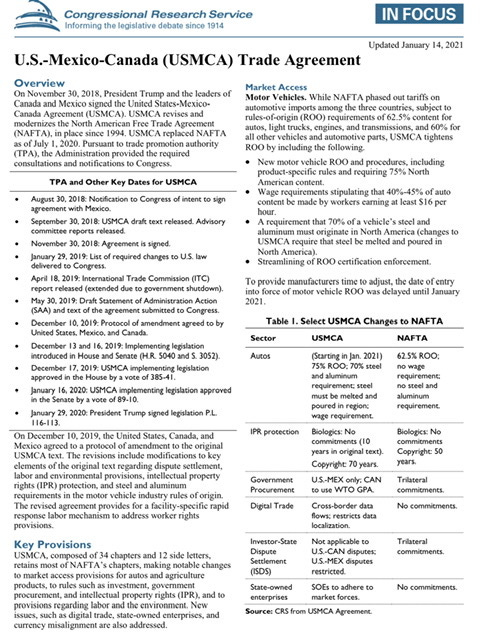
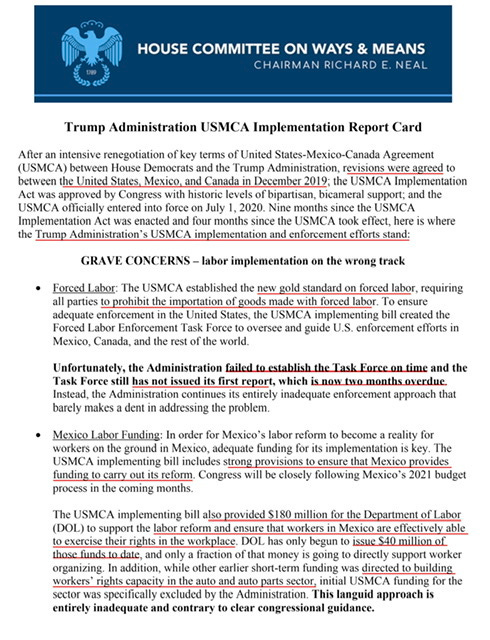
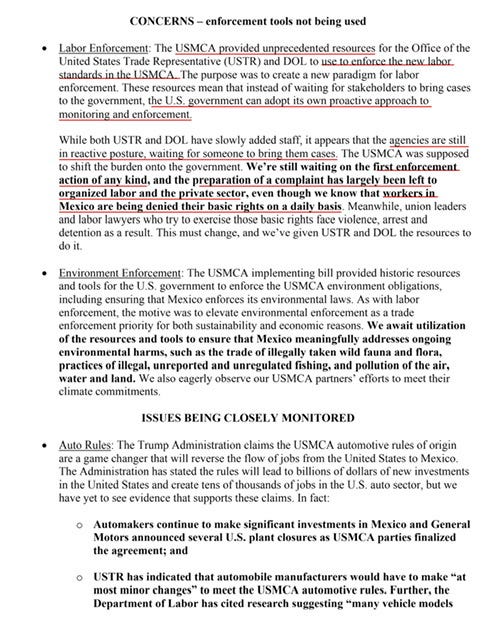

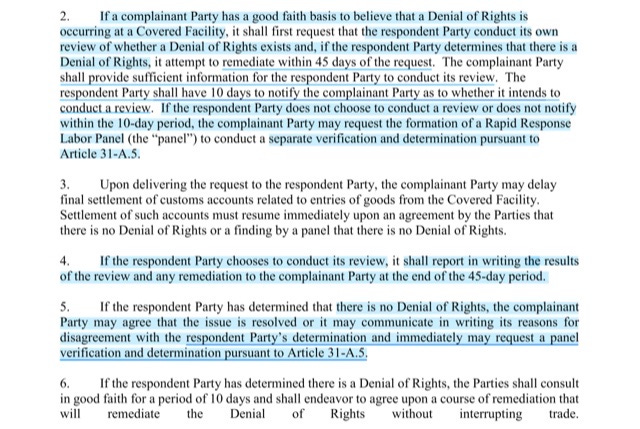
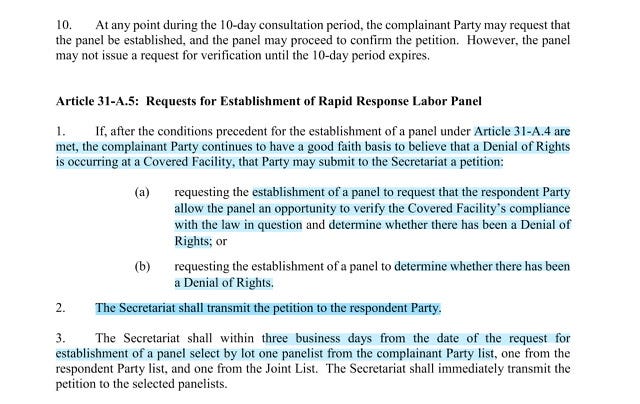


In another life I will be an attorney specializing in some type of labor worker's rights law. I'm ecstatically happy we have a pro union president. However not getting the law degree in this life, I instead in this life. when I worked for corporations, (now self employed) I seemed to have a knack for seeing labor violations and ever so nicely pointing them out to management. Most involved how and when we were paid or such health and safety issues as requiring us to stay working when the A/C went out, no windows that opened and inside temps soaring to near 90 degrees. It delighted me to see my observations greeted with the management eye roll of "oh her again ", and just tickled me when management and fellow employees eventually nicked named me "Little Norma Rae" . Filey your deep dive into this first comprehensive Biden labor watchdog policy is so inspiring and uplifting; and may it signal so much more pro labor policy coming in the near future !